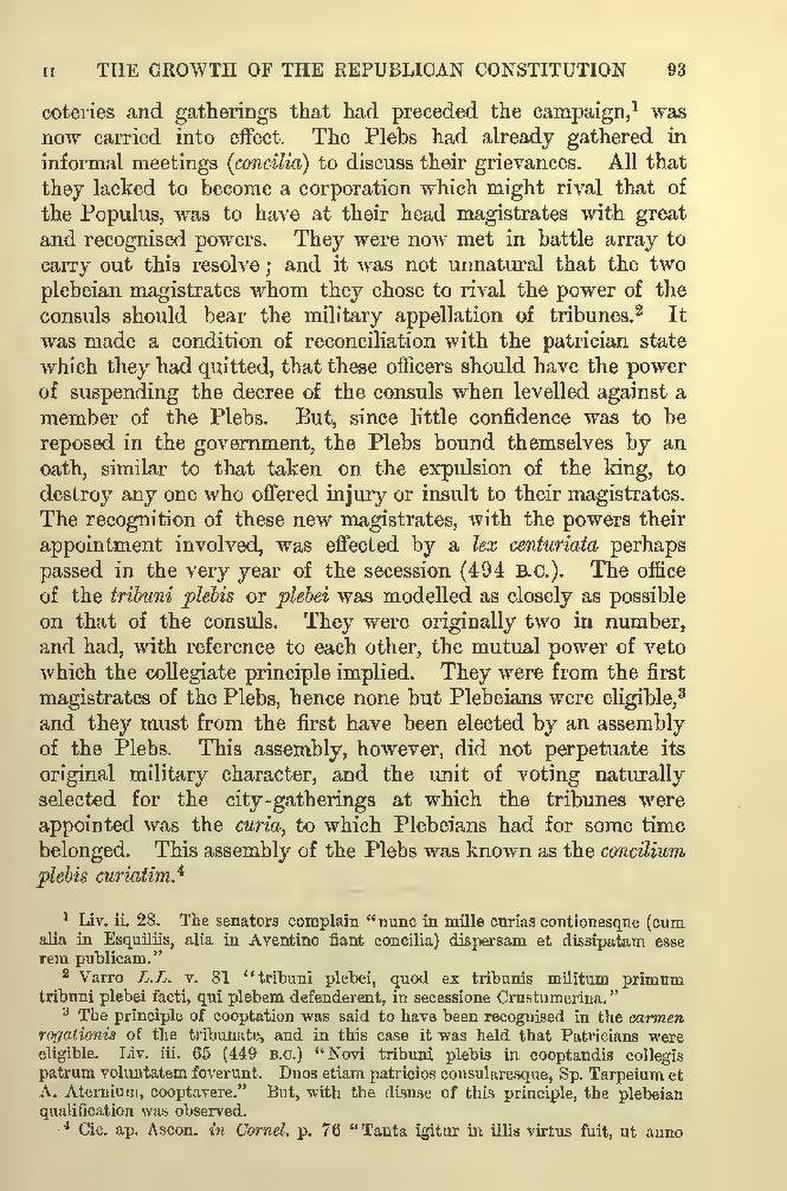coteries and gatherings that had preceded the campaign,[1] was now carried into effect. The Plebs had already gathered in informal meetings (concilia) to discuss their grievances. All that they lacked to become a corporation which might rival that of the Populus, was to have at their head magistrates with great and recognised powers. They were now met in battle array to carry out this resolve; and it was not unnatural that the two plebeian magistrates whom they chose to rival the power of the consuls should bear the military appellation of tribunes.[2] It was made a condition of reconciliation with the patrician state which they had quitted, that these officers should have the power of suspending the decree of the consuls when levelled against a member of the Plebs. But, since little confidence was to be reposed in the government, the Plebs bound themselves by an oath, similar to that taken on the expulsion of the king, to destroy any one who offered injury or insult to their magistrates. The recognition of these new magistrates, with the powers their appointment involved, was effected by a lex centuriata perhaps passed in the very year of the secession (494 B.C.). The office of the tribuni plebis or plebei was modelled as closely as possible on that of the consuls. They were originally two in number, and had, with reference to each other, the mutual power of veto which the collegiate principle implied. They were from the first magistrates of the Plebs, hence none but Plebeians were eligible,[3] and they must from the first have been elected by an assembly of the Plebs. This assembly, however, did not perpetuate its original military character, and the unit of voting naturally selected for the city-gatherings at which the tribunes were appointed was the curia, to which Plebeians had for some time belonged. This assembly of the Plebs was known as the concilium plebis curiatim.[4]*
- ↑ Liv. ii. 28. The senators complain "nunc in mille curias contionesque (cum alia in Esquiliis, alia in Aventino fiant concilia) dispersam et dissipatam esse rem publicam."
- ↑ Varro L.L. v. 81 "tribuni plebei, quod ex tribunis militum primum tribuni plebei facti, qui plebem defenderent, in secessione Crustumerina."
- ↑ The principle of cooptation was said to have been recognised in the carmen rogationis of the tribunate, and in this case it was held that Patricians were eligible. Liv. iii. 65 (449 B.C.) "Novi tribuni plebis in cooptandis collegis patrum voluntatem foverunt. Duos etiam patricios consularesque, Sp. Tarpeium et A. Aternium, cooptavere." But, with the disuse of this principle, the plebeian qualification was observed.
- ↑ Cic. ap. Ascon. in Cornel. p. 76 "Tanta igitur in illis virtus fuit, ut anno
